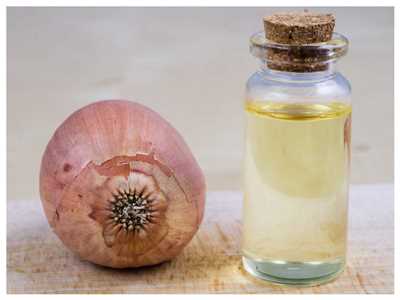
Onion oil is a selected homemade remedy that has been widely adopted for its numerous functions and related benefits. The above-mentioned solution is made using onions, a common vegetable known for its rich content of sulfur compounds. This natural agent, often used in agricultural practices, comprises an effective solution for various ailments and is gaining popularity due to its diverse applications.
When it comes to making onion oil, the process involves the extraction of essential oils from onions. The selected onions are cleaned and promptly processed to ensure the best quality oil. The extraction can be done using different methods, but distillation is recommended for a more potent and concentrated oil. This distillation process helps in breaking down the ingredients and obtaining a creamy and aromatic onion oil.
One of the main benefits of onion oil is its high sulfur content, which is known to have a positive effect on hair and scalp health. Applying onion oil regularly can help get rid of lice and promote hair growth. The therapeutic properties of onion oil are also useful for treating various skin conditions and infections.
To make onion oil at home, you will need fresh onions, a container for processing, and a carrier oil such as olive oil or coconut oil. It is recommended to use organically grown onions as they have a higher sulfur content. The onions can be soaked overnight or for a few hours to enhance their medicinal properties. Once soaked, the onions are blended and mixed with the carrier oil to initiate the extraction process. The mixture is then heated and simmered to allow the essential oils to get fully infused into the carrier oil.
The yield and quality of the onion oil can be further enhanced by using advanced extraction techniques such as supercritical fluid extraction or 3ssoch technology. These methods ensure that the final product has a higher concentration of sulfur compounds and other beneficial compounds found in onions. However, for homemade use, regular distillation or soaking methods are sufficient.
When using onion oil, it is important to note that some people may have a weak reaction or sensitivity to the strong smell. In such cases, diluting the oil with a carrier oil or using it in small amounts is recommended. It is also advisable to perform a patch test before applying onion oil topically on the skin or scalp.
In summary, making onion oil at home is a simple and cost-effective way to obtain a natural remedy with multiple functions and therapeutic benefits. This homemade solution, enriched with sulfur compounds and other essential ingredients, can be a valuable addition to your health and beauty routine. By adopting the described methods and techniques, you can easily create your own onion oil to enjoy its numerous applications and harness its amazing potential.
- Homemade Wild Onion Oil
- Benefits of Onion Oil
- Ingredients
- Procedure
- Description
- Benefits Of Onions For Hair
- FAQs On Best Onion Oil For Hair
- 1 Recommend onion herbal hair oil for daily use
- 2 Suggest best onion hair oil for hair growth
- 3 Please recommend ways to get rid of the onion smell that comes with applying onion oil regularly
- FAQ
- Video:
- Hair Growth Oil By ijaz Ansari | Make Onion Hair Oil For Faster Hair Growth And Stope Hair Fall
Homemade Wild Onion Oil
Onion oil is a natural hair care product that has been used for centuries to improve hair health. It is rich in sulfur, which is essential for hair growth and strength, and also has antimicrobial properties that can help fight scalp infections and reduce hair fall. Making onion oil at home is a simple process that can be done with just a few ingredients and equipment. In this article, we will provide a step-by-step guide on how to make homemade wild onion oil.
Benefits of Onion Oil
Onion oil has several benefits for hair health. Regularly applying onion oil can:
- Stimulate hair growth
- Prevent hair breakage
- Improve hair texture
- Reduce dandruff
- Prevent scalp infections
Ingredients
To make onion oil at home, you will need the following ingredients:
- 2 onions
- 1 cup of carrier oil (such as olive oil or coconut oil)
Procedure
Follow these steps to make homemade wild onion oil:
- Peel and finely chop 2 onions.
- Heat 1 cup of carrier oil in a pan.
- Add the chopped onions to the pan and cook on low heat for about 30 minutes, stirring occasionally.
- Remove the pan from heat and let the mixture cool down.
- Once cooled, strain the oil using a fine mesh strainer or cheesecloth to separate the onion extract from the oil.
- Transfer the oil to a clean, airtight container for storage.
It is recommended to use this homemade wild onion oil regularly for best results. Apply a small amount of oil to your hair and scalp, massage it gently, and leave it on for about 2 hours before washing it off with a mild shampoo.
Please note that the smell of onion oil can be strong. If you find the scent unpleasant, you can add a few drops of essential oil, such as lavender or rosemary, to mask the smell.
It’s important to mention that this homemade onion oil is suitable for external use only. Avoid contact with eyes, and in case of any irritation or allergic reaction, discontinue use and consult a dermatologist.
In conclusion, making homemade wild onion oil is a cost-effective and easy way to improve hair health. By adopting this natural hair care method, you can enjoy the benefits of onion oil without breaking the bank. Give it a try and see the positive effects on your hair!
Description
The description of onion oil production involves the extraction of the beneficial properties found within onions. The process begins with the collection of wild or cultivated onions, which are then washed, peeled, and pulverized. The pulverized onions are then soaked in water and subjected to distillation, either through the use of a traditional distillation method or the above-mentioned invention of Alexis et al. called the “onion-infused oil distillment method.”
This distillation process yields a yellowish oil with a strong onion smell. The resulting oil contains essential oils, sulfides, sulfoxides, and sulfur compounds, as well as other minor components. These components are responsible for the various benefits that onion oil offers.
Onion oil can be applied topically to the hair and scalp to promote hair growth and reduce hair loss. The oil’s composition helps to improve blood circulation, which in turn stimulates hair follicles and promotes the growth of stronger, thicker hair. Onion oil is also known to have hypoglycemic and anticancer effects, making it a versatile ingredient in various herbal products.
Studies have shown that applying onion oil regularly can help prevent grey hair and strengthen weak and brittle hair. The oil’s natural properties help to nourish and hydrate the hair, making it healthier and more lustrous. Additionally, the antimicrobial properties of onion oil make it an effective treatment for dandruff and scalp infections.
To make homemade onion oil, one can adopt the following method:
- Take a suitable quantity of onions and peel and chop them.
- Place the chopped onions in a large container and soak them in water for a minimum of 2 hours or overnight.
- After soaking, drain the water and transfer the soaked onions into a large pot.
- Add a suitable solvent, such as methyl or methylene chloride, to the pot. The solvent helps in the extraction process and evaporates easily.
- Cover the pot and heat it on a low flame for several hours. This will allow the compounds in the onions to be extracted into the solvent.
- After heating, remove the pot from the stove and let it cool.
- Once cooled, strain the mixture to separate the onion extracts from the solvent.
- The resulting mixture can be further processed and refined to obtain pure onion oil.
The above-mentioned method utilizes a solvent-based extraction, which is suitable for extracting onion oil on a small scale. However, for large-scale production, other methods such as steam distillation or cold pressing can be adopted.
It is important to note that onion oil should be used cautiously. It is recommended to do a patch test on your skin before applying it to your hair or scalp, as some people may have allergic reactions or sensitivity to onion oil.
In summary, onion oil extraction is a process that utilizes the properties of onions to yield a beneficial oil. Its production involves collecting and processing onions to obtain a yellowish oil with a distinct smell. This homemade oil can then be used to promote hair growth, improve hair health, and provide other health benefits.
Benefits Of Onions For Hair
Onions have numerous benefits for hair health and can be effectively used in the preparation of onion oil. Some of the key benefits of onions for hair are:
- Promotes Hair Growth: Onions are rich in sulfur, which helps in regenerating hair follicles and promoting hair growth. Regular use of onion oil can reduce hair thinning and prevent hair loss.
- Prevents Greying: The high sulfur content in onions helps to prevent premature greying of hair. Applying onion oil to the scalp regularly can help maintain the natural color of hair and delay the onset of greying.
- Strengthens Hair: Onions contain antioxidants that help to strengthen the hair strands and make them less prone to breakage. This can result in healthier and stronger hair.
- Improves Scalp Condition: The antibacterial and antifungal properties of onions can help to improve scalp health and prevent conditions like dandruff and scalp infections. Regular use of onion oil can soothe an itchy scalp and promote a healthy scalp environment.
- Enhances Hair Shine: The natural oils present in onions can add shine to dull and lifeless hair. Regular use of onion oil can make your hair look healthier and more vibrant.
Overall, onions are a natural and cost-effective solution for hair-related issues. Incorporating onion oil or onion-infused hair products into your hair care routine can yield significant results. However, it is important to note that individual results may vary, and it is recommended to consult a professional before making any significant changes to your hair care routine.
FAQs On Best Onion Oil For Hair
Q: What is onion oil?
A: Onion oil is a type of oil that is derived from the onion plant. It is known for its various benefits for hair health and growth.
Q: How is onion oil made?
A: Onion oil is made through the process of extraction. The onions are first crushed or grated, and then the juice is obtained by pressing or distillation.
Q: What are the benefits of onion oil for hair?
A: Onion oil has several benefits for hair, including promoting hair growth, reducing hair fall, preventing greying of hair, and improving overall hair health.
Q: How can onion oil be used?
A: Onion oil can be used by massaging it into the scalp and leaving it on for a few hours or overnight. It can also be mixed with other hair oils or added to shampoos for regular use.
Q: Does onion oil smell bad?
A: Onion oil does have a strong smell due to the sulfur content in onions. However, some onion oils are formulated to have a milder scent.
Q: How often should I use onion oil?
A: It is recommended to use onion oil regularly for best results. Applying it 2-3 times a week or as per your hair’s needs is a good practice.
Q: Can onion oil be used by everyone?
A: Yes, onion oil is generally safe for use by everyone. However, if you have any specific concerns or allergies, it is best to consult a dermatologist or healthcare professional.
Q: Are there any side effects of using onion oil?
A: There are no known side effects of using onion oil. However, some people may experience mild scalp irritation or an allergic reaction. It is always recommended to do a patch test before full use.
Q: How long does it take to see results from using onion oil?
A: The time required to see results may vary from person to person. In general, it is recommended to use onion oil consistently for a few weeks to notice any significant changes.
Q: Can onion oil be used for other purposes besides hair care?
A: While onion oil is primarily used for hair care, it is also known for its potential health benefits when applied topically or consumed orally.
Note: The information provided above is for general knowledge only. If you have any specific queries or concerns, please consult a healthcare professional.
1 Recommend onion herbal hair oil for daily use
If you’re looking for a natural and effective way to promote hair growth and improve the overall condition of your hair, I highly recommend using onion herbal hair oil on a daily basis. This oil is derived from onions and has numerous benefits for your hair.
To make onion herbal hair oil, you’ll need to start by pulverizing onions into a fine paste. After that, soak the pulverized onions in a container filled with water and let it sit overnight. This soaking process helps extract the beneficial substances from the onions.
Once the onions have been soaked overnight, you can proceed with processing the oil. Take the soaked onions and squeeze out the liquid to obtain the onion oil. This oily substance will have a strong onion smell, but don’t worry, it will dissipate after application.
Using the above-mentioned technology, you can make a fresh batch of onion herbal hair oil every day. The process is simple and the investment is minimal, making it a cost-effective way to take care of your hair.
The benefits of onion herbal hair oil are endless. It helps stimulate hair growth, prevents hair fall, reduces dandruff, and improves the overall health and shine of your hair. The oil is also known to help prevent premature greying of hair.
I suggest using this oil on a daily basis for maximum benefits. Simply apply a small amount of the onion herbal hair oil to your scalp and massage it in gently. Leave it on for at least an hour before washing it off with a mild shampoo.
The onion herbal hair oil is safe to use daily and can be used by all age groups. It is a natural and chemical-free alternative to commercial hair products that may contain harmful ingredients.
To reap the maximum benefits of the onion herbal hair oil, I recommend applying it at night before going to bed. This allows the oil to penetrate the scalp and hair follicles overnight for better results.
In conclusion, onion herbal hair oil is a highly recommended natural remedy for hair care. Its composition of onion extracts and herbals provides numerous benefits for your hair and scalp. Make it a part of your daily hair care routine and say goodbye to hair problems.
2 Suggest best onion hair oil for hair growth

When it comes to maximizing hair growth, onion-infused hair oil is a popular remedy. The extraction of onion oil is a process that involves obtaining the oil from onions, which are rich in sulfur compounds and have been known for their hair growth benefits.
There are many hair oil products available in the market that claim to promote hair growth. However, the best onion hair oils are those that comprise organic and natural ingredients without any harmful additives. Below, we suggest two highly recommended onion hair oils:
| Product Name | Description |
|---|---|
| Alexis Organic Onion Hair Oil | This hair oil is made from a composition of organic ingredients, including onion extract, acetate, and other natural herbs. It is free from parabens and sulfates, making it suitable for all hair types. Alexis Organic Onion Hair Oil is known for its tight oil-formation technology, which helps deliver the maximum benefits of onion oil for hair growth. |
| Wild Growth Hair Oil | This hair oil is a blend of several organic oils, including onion-infused oil. It has been a popular choice for promoting hair growth owing to its supercritical extraction technology. The Wild Growth Hair Oil is rich in essential fatty acids, vitamins, and minerals that nourish the hair follicles and improve hair health. |
Both of these onion hair oils are highly recommended for those who are seeking an effective remedy to promote hair growth. They contain the above-mentioned compounds and have shown positive results in stimulating hair growth.
It is important to note that while onion hair oils can greatly benefit hair growth, individual results may vary. It is always recommended to consult a hair care professional before using any new hair product.
FAQs:
– Can onion hair oil get rid of hair fall?
– Onion hair oil has shown effective results in reducing hair fall and promoting hair growth.
– How long should I soak onions for onion oil?
– Soaking onions for about an hour is sufficient to extract the necessary substances for onion oil production.
– Does onion oil smell bad?
– The distinctive smell of onion oil is related to the sulfur compounds present in onions. However, onion hair oils often have additional ingredients that help mask the strong smell.
– Are there any side effects of using onion-infused hair oil?
– Generally, there are no serious side effects of using onion-infused hair oil. However, some individuals may experience mild scalp irritation. It is recommended to do a patch test before applying the oil to the entire scalp.
– Can onion oil be used on colored hair?
– Yes, onion oil can be used on colored hair without any adverse effects.
By adopting the recommended onion hair oils, you can provide your hair with the necessary nutrients and promote healthy hair growth.
3 Please recommend ways to get rid of the onion smell that comes with applying onion oil regularly
While onion oil has many beneficial functions for the hair and skin, the strong odor it imparts can be a concern for some people. If you find the smell of onion oil intolerable after applying it regularly, here are a few suggestions to help minimize or eliminate the onion smell:
- Wash with a mild shampoo: After applying onion oil, wash your hair or skin with a mild shampoo to help remove the smell. Use a fragrant conditioner or rinse to mask any lingering odor.
- Use lemon juice: Lemon juice is known for its ability to neutralize odors. Squeeze fresh lemon juice onto your hair or skin and massage it in. Rinse thoroughly after a few minutes. This can help counteract the onion smell and leave a pleasant citrusy fragrance.
- Avoid heat: Heat can intensify the scent of onion oil. If possible, avoid using heating tools like blow dryers, straighteners, or curling irons after applying onion oil. Let your hair or skin air dry naturally.
- Try herbal remedies: Certain herbs like mint, rosemary, or lavender have strong fragrances that can help mask the onion smell. You can prepare a homemade herbal rinse by steeping these herbs in hot water and using it as a final rinse after shampooing.
- Opt for essential oils: Essential oils like tea tree oil, peppermint oil, or eucalyptus oil can be added to your shampoo or conditioner to help overpower the onion smell. These oils not only have pleasant aromas but also provide additional benefits for your hair and skin.
- Store onion oil properly: Make sure to store your onion oil in a tightly sealed container to prevent the smell from permeating other items. If possible, store it in a cool, dark place.
- Use an alternate application method: If the smell persists, you can try diluting the onion oil with a carrier oil like coconut oil or olive oil. This can help reduce the intensity of the smell while still providing the benefits of onion oil.
By adopting these techniques and exploring different options, you can minimize or eliminate the onion smell that comes with applying onion oil regularly. Choose the method that works best for you and enjoy the benefits of onion oil without the lingering odor!
FAQ
Q: How does onion oil work for hair?
A: Onion oil works effectively for hair as it contains sulfur that helps in improving blood circulation, reducing hair fall, and promoting hair growth.
Q: Can homemade onion oil be used for greying hair?
A: Yes, homemade onion oil can be used for greying hair. The high concentration of sulfur in onion oil helps in reducing greying of hair and restoring natural color.
Q: What is the recommended method for making onion oil at home?
A: The recommended method for making onion oil at home is by using the fermentation process. It involves pulverizing onions, adding them to a container, and allowing the mixture to ferment for a couple of hours. This method helps in obtaining a high-efficient extract of onion oil.
Q: What are the benefits of using onion oil for hair?
A: Using onion oil for hair has many benefits including promoting hair growth, reducing hair fall, improving hair texture, preventing scalp infections, and restoring natural color.
Q: How does the extraction process of onion oil work?
A: The extraction process of onion oil involves breaking down the onions and then distilling the liquid through a tight distillment. This process helps in obtaining the yellow oil that is rich in sulfur and other beneficial compounds.
Q: How often should I use onion oil on my hair?
A: It is recommended to use onion oil on your hair at least once a week to see noticeable results. However, the frequency may vary depending on individual hair condition and preferences.
Q: Can onion oil be used on all hair types?
A: Yes, onion oil can be used on all hair types. It is suitable for dry, oily, normal, and even chemically treated hair.
Q: Does onion oil help in reducing hair fall?
A: Yes, onion oil is known to help in reducing hair fall by strengthening the hair follicles and nourishing the scalp.
Q: Can I use onion oil as a pre-shampoo treatment?
A: Yes, onion oil can be used as a pre-shampoo treatment. Applying onion oil on the scalp and hair before shampooing helps in nourishing and conditioning the hair, making it more manageable.
Q: Does onion oil have any side effects?
A: Onion oil is generally safe to use. However, some individuals may experience mild irritation or allergic reactions. It is recommended to do a patch test before applying onion oil directly on the scalp.
Q: Where can I buy onion oil?
A: Onion oil can be purchased from various online retailers, local pharmacies, or health stores. Alternatively, you can make onion oil at home using the recommended method.









